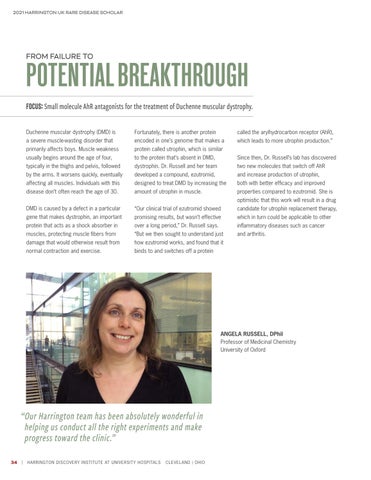2021 HARRINGTON UK RARE DISEASE SCHOLAR
FROM FAILURE TO
POTENTIAL BREAKTHROUGH FOCUS: Small molecule AhR antagonists for the treatment of Duchenne muscular dystrophy. Duchenne muscular dystrophy (DMD) is
Fortunately, there is another protein
called the arylhydrocarbon receptor (AhR),
a severe muscle-wasting disorder that
encoded in one’s genome that makes a
which leads to more utrophin production.”
primarily affects boys. Muscle weakness
protein called utrophin, which is similar
usually begins around the age of four,
to the protein that’s absent in DMD,
Since then, Dr. Russell’s lab has discovered
typically in the thighs and pelvis, followed
dystrophin. Dr. Russell and her team
two new molecules that switch off AhR
by the arms. It worsens quickly, eventually
developed a compound, ezutromid,
and increase production of utrophin,
affecting all muscles. Individuals with this
designed to treat DMD by increasing the
both with better efficacy and improved
disease don’t often reach the age of 30.
amount of utrophin in muscle.
properties compared to ezutromid. She is
DMD is caused by a defect in a particular
“Our clinical trial of ezutromid showed
candidate for utrophin replacement therapy,
gene that makes dystrophin, an important
promising results, but wasn’t effective
which in turn could be applicable to other
protein that acts as a shock absorber in
over a long period,” Dr. Russell says.
inflammatory diseases such as cancer
muscles, protecting muscle fibers from
“But we then sought to understand just
and arthritis.
damage that would otherwise result from
how ezutromid works, and found that it
normal contraction and exercise.
binds to and switches off a protein
optimistic that this work will result in a drug
ANGELA RUSSELL, DPhil Professor of Medicinal Chemistry University of Oxford
“Our Harrington team has been absolutely wonderful in helping us conduct all the right experiments and make progress toward the clinic.” 34
|
HARRINGTON DISCOVERY INSTITUTE AT UNIVERSITY HOSPITALS
CLEVELAND | OHIO








